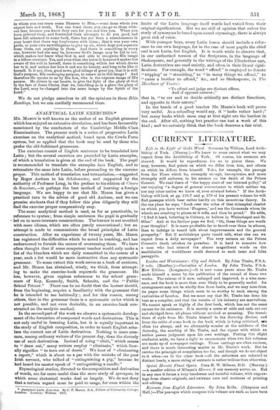ANALYTICAL LATIN EXERCISES.*
Mn. MASON is well known as the author of an English grammar which has enjoyed an extensive circulation, and has been favourably mentioned by the conductors of the Cambridge Middle-Class Examinations. The present work is a series of progressive Latin exercises on the analytical method, based upon the Crude Form system, but so applied that the book may be used by those who prefer the old-fashioned grammars.
The exercises consist of English sentences to be translated into Latin ; but the several exercises are preceded by Latin examples, of which a translation is given at the end of the book. The pupil is recommended to translate the examples into English, and to retranslate the same into Latin, before proceeding to the exercise proper. This method of translation and retranslation,—suggested by Roger Ascham in his Scholemaster, and supported by the authority of Professor Long, in the preface to his edition of Cicero de Senectute,—is perhaps the best method of learning a foreign language. We are happy to see that Mr. Mason has given a practical turn to the advice of good old Ascham, and we can promise students that if they follow this plan diligently they will find the exercise proper comparatively easy.
The same analytical method is used, as far as practicable, in reference to syntax ; from simple sentences the pupil is gradually led on to more intricate constructions. The learner is not troubled with mere idioms, which are often purely conventional ; but an attempt is made to communicate the broad principles of Latin construction. After an experience of twenty years, Mr. Mason has registered the difficulties which he noted in teaching, and has endeavoured to furnish the means of overcoming them. We have often thought that if some competent teacher would only make a list of the blunders which are daily committed in the course of a year, such a list would be more instructive than any systematic grammar. To some extent this work serves as a book of cautions, and Mr. Mason has abstained, wisely, we think, from attempt- ing to make the exercise-book supersede the grammar. He has, however, given copious references to the school gram- mars of Key, Kennedy, Smith, Schmitz, and the " Public School Primer." There can be no doubt that the learner should, from the beginning, acquire a familiarity with the grammar that he is intended to use habitually ; and for this reason, among others, that in the grammar there is a systematic order which is not possible, and not even desirable, in an exercise-book con- structed on the analytic method.
In the second part of the work we observe a systematic develop- ment of the formation of compound words and derivatives. This is not only useful in learning Latin, but it is equally important in the study of English composition, in order to teach English scho- lars the correct use of Latin derivatives. Nothing is more com- mon, among ordinary writers of the present day, than the slovenly use of such derivatives. Instead of using "elicit," which means to " draw out," many writers employ " eliminate," which liter- ally signifies " to turn out of doors." We hear of " eliminating a report," which is about on a par with the mistake of the poor Irish servant, who talked of " extinguishing a pig," because he had heard his master speak of " extinguishing a candle."
Etymological studies, directed to the composition and derivatino of words, are far more useful than the mere study of synonyms, in which some rhetorical works deal so largely. We do not deny that a certain regard must be paid to usage, for even within the • Analytical Latin Exercises. Bye. P. Mason. B.A., Fellow of University College, London. London: Walton. 1857.
limits of the Latin language itself words had varied from their original significations. But we are still of opinion that unless the study of synonyms be based upon sound etymology, there is always great risk of error.
With younger boys, every Latin lesson should include a refer- ence to our own language, for in the case of most pupils the chief end is not Latin, but English. It is worth while to observe that, in our authorized version of the Scriptures, in the language of Shakespeare, and generally in the writings of the Elizabethan age, Latin derivatives are used strictly, and often in their literal signi- fications. For example, the word " offend " is employed to denote "tripping" or " stumbling," as " in many things we offend," to " cause a brother to offend," &c., and so Shakespeare, in The Merchant of Venice:
"To offend and judge are distinct offices, And of opposed natures ;"
that is, "to err and to decide critically are distinct functions, and opposite in their nature."
In the hands of a good teacher Mr. Mason's book will prove very useful. As a schoolboy would say, it " looks rather hard ;" but many books which seem easy at first sight are the hardest in the end. After all, nothing but practice can test a work of this kind ; and we certainly think that the book deserves a fair trial.






























 Previous page
Previous page